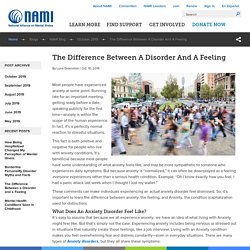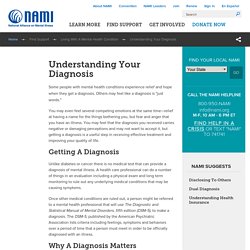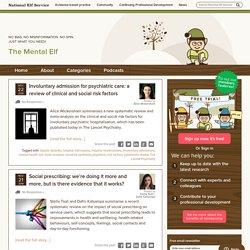

10/10/19: The Difference Between a Disorder and a Feeling. By Luna Greenstein | Oct. 10, 2019 Most people have experienced anxiety at some point.

Running late for an important meeting, getting ready before a date, speaking publicly for the first time—anxiety is within the scope of the human experience. In fact, it’s a perfectly normal reaction to stressful situations. This fact is both positive and negative for people who live with anxiety conditions. It’s beneficial because most people have some understanding of what anxiety feels like, and may be more sympathetic to someone who experiences daily symptoms. These comments can make individuals experiencing an actual anxiety disorder feel dismissed. What Does an Anxiety Disorder Feel Like? It’s easy to assume that because we all experience anxiety, we have an idea of what living with Anxiety might feel like. Emotional: Feelings of apprehension or dread Feeling tense and jumpy Restlessness or irritability Anticipating the worst and being watchful for signs of danger Physical: Panic attacks? Understanding Your Diagnosis. Some people with mental health conditions experience relief and hope when they get a diagnosis.

Others may feel like a diagnosis is "just words. " You may even feel several competing emotions at the same time—relief at having a name for the things bothering you, but fear and anger that you have an illness. You may feel that the diagnosis you received carries negative or damaging perceptions and may not want to accept it, but getting a diagnosis is a useful step in receiving effective treatment and improving your quality of life. Getting a Diagnosis Unlike diabetes or cancer there is no medical test that can provide a diagnosis of mental illness. Once other medical conditions are ruled out, a person might be referred to a mental health professional that will use The Diagnostic and Statistical Manual of Mental Disorders, fifth edition (DSM-5), to make a diagnosis.
Why a Diagnosis Matters A medical professional determines a diagnosis by interviewing you about your history of symptoms.
AD/HD. PTSD. Seasonal Affective Disorder (SAD) Meditate / Mindfulness - Copy. Mindfulness Practices For Non-Meditators. Michael Singer, author of The Surrender Experiment, tells the story of a conversation he had when he was a young man.

At a pause in the conversation, Singer found himself considering where to take the conversation next. What happened next was what we call a “light bulb moment.” “There is nothing more important to true growth than realizing that you are not the voice of the mind—you are the one who hears it.” He became aware of his inner voice: the meta-thinking part of his brain that was scrambling for a way to restart the conversation. “I noticed that I was uncomfortable and trying to find something to say,” he recounts in his autobiography. If you’ve ever tried to meditate, you know that inner voice won’t shut up. Would you ever put up with someone who told you that you’re not good enough, who constantly reminded you of your worst moments, or continually predicted the worst is likely to happen? Over the past several decades, I’ve learned a few tricks to become aware of this voice.
NAMI -The National Association on Mental Illness. The Mental Elf. Alice Wickersham summarises a new systematic review and meta-analysis on the clinical and social risk factors for involuntary psychiatric hospitalisation, which has been published today in The Lancet Psychiatry.

[read the full story...] Stella Tsoli and Dafni Katsampa summarise a recent systematic review on the impact of social prescribing on service users, which suggests that social prescribing leads to improvements in health and wellbeing, health-related behaviours, self-concepts, feelings, social contacts and day-to-day functioning. [read the full story...] Sarah Gregory summarises findings from a large dataset analysis which explores the relationship between watching television and later cognitive decline. [read the full story...] Keith Laws looks at a systematic review of patient and study characteristics, which asks: are randomised controlled trials on pharmacotherapy and psychotherapy for positive symptoms of schizophrenia comparable?
[read the full story...] [read the full story...] Brain. Psychotherapy. Where Emotion Is Felt in the Human Body.